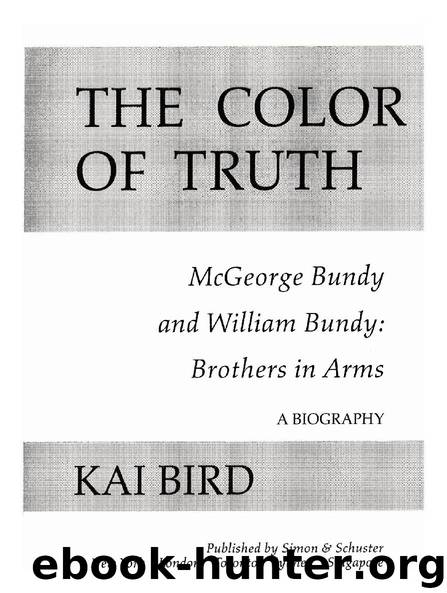The Color of Truth by Kai Bird

Author:Kai Bird
Language: eng
Format: epub
Publisher: Simon & Schuster
Michael Forrestal later recalled a conversation he had with Kennedy which, if true, suggests that the president was indeed struggling in his own thinking toward a neutralist-withdrawal solution for Vietnam. Forrestal saw Kennedy for the last time on Thursday, November 21, 1963, in the Oval Office. Forrestal was about to fly to Phnom Penh, where he had instructions to reassure Cambodia’s ruler, Prince Norodom Sihanouk, that the United States still strongly supported his country’s neutrality “During the course of this conversation,” Forrestal said, “he [Kennedy] did what he sometimes did at the end of the day, or when he was a little tired. He asked me to stay a bit and he said, ‘You know, when you come back, I want you to come and see me because we have to start to plan for what we are going to do now in South Vietnam.’ He said, Τ want to start a complete and very profound review of how we got into this country, and what we thought we were doing, and what we now think we can do.’ He said, ‘I even want to think about whether or not we should be there.’ He said, because this was, of course, in the context of an election campaign also, that he didn’t think that we could consider drastic changes of policy, quickly.” Forrestal claimed that Kennedy wanted to think about “how some kind of a gradual shift in our presence in South Vietnam [could] occur.” Forrestal emphasized that he had “a very clear recollection of it [the conversation] and, of course, the following morning when I arrived in Saigon, actually it was night out there, or two o’clock in the morning, he was killed.” 33
If President Kennedy was thinking about a “gradual shift” in policy, clearly it was only going to happen, if at all, after the election. In 1963 he had one overarching concern when it came to the “commitment” in Vietnam, and that was campaign politics. He told O’Donnell, “If I tried to pull out completely now from Vietnam, we would have another Joe McCarthy scare on our hands, but I can do it after I’m re-elected.” 34 Thus, for domestic political reasons, Kennedy was far from ready to walk away from Vietnam. What he would have done in 1965 will remain unknown. But we do know that in the autumn of 1963 he was encouraging the Bundy brothers and other advisers to do everything they could to create a viable political regime in Saigon, one capable of winning the war against the Viet Cong in the countryside.
It should also be noted that the president’s closest adviser, his brother Robert, also seemed to have been skeptical of the American commitment. At a September 6 meeting of the NSC, according to Hilsman, Bobby Kennedy even echoed the fundamental question raised by Kattenburg a week earlier: could any Saigon government successfully resist a communist takeover? “If it could not,” Bobby said, “now was the time to get out of Vietnam entirely, rather than waiting.
Download
This site does not store any files on its server. We only index and link to content provided by other sites. Please contact the content providers to delete copyright contents if any and email us, we'll remove relevant links or contents immediately.
The Secret History by Donna Tartt(19045)
The Social Justice Warrior Handbook by Lisa De Pasquale(12185)
Thirteen Reasons Why by Jay Asher(8887)
This Is How You Lose Her by Junot Diaz(6874)
Weapons of Math Destruction by Cathy O'Neil(6263)
Zero to One by Peter Thiel(5786)
Beartown by Fredrik Backman(5737)
The Myth of the Strong Leader by Archie Brown(5496)
The Fire Next Time by James Baldwin(5429)
How Democracies Die by Steven Levitsky & Daniel Ziblatt(5211)
Promise Me, Dad by Joe Biden(5141)
Stone's Rules by Roger Stone(5080)
A Higher Loyalty: Truth, Lies, and Leadership by James Comey(4948)
100 Deadly Skills by Clint Emerson(4918)
Rise and Kill First by Ronen Bergman(4777)
Secrecy World by Jake Bernstein(4740)
The David Icke Guide to the Global Conspiracy (and how to end it) by David Icke(4699)
The Farm by Tom Rob Smith(4502)
The Doomsday Machine by Daniel Ellsberg(4484)
